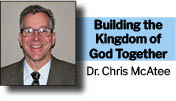
Our children, grandchildren, relatives, friends, neighborhood children, and maybe some of us are now all back to school.
In this “back to school” spirit, I would like to invite all of you to go back to school this academic year to learn more about and integrate into your life even further a very important part of our Catholic faith, our Catholic Social Teaching.
Your homework, if you so choose to accept this mission, is four-fold:
Watch Bishop Hying’s video on Building the Kingdom of God-Promoting Catholic Social Teaching at
bitly.ws/Vsa2
Read about the seven themes of Catholic Social Teaching throughout the rest of this column.
Choose two to three of the themes to study and further implement into your life this school year and decide how you are going to do so.
Email me at chris.mcatee@madisondiocese.org by Wednesday, Oct. 11, with a summary of your plan, and I will include as many plans as possible in my next column.
Seven themes of Catholic Social Teaching
The following information comes from the United States Conference of Catholic Bishops and can be found at usccb.org/resources/themes-catholic-social-teaching
Life and Dignity of the Human Person: The Catholic Church proclaims that human life is sacred and that the dignity of the human person is the foundation of a moral vision for society.
This belief is the foundation of all the principles of our social teaching.
In our society, human life is under direct attack from abortion and euthanasia.
The value of human life is being threatened by cloning, embryonic stem cell research, and the use of the death penalty.
The intentional targeting of civilians in war or terrorist attacks is always wrong.
Catholic teaching also calls on us to work to avoid war.
Nations must protect the right to life by finding increasingly effective ways to prevent conflicts and resolve them by peaceful means.
We believe that every person is precious, that people are more important than things, and that the measure of every institution is whether it threatens or enhances the life and dignity of the human person.
Call to Family, Community, and Participation: The person is not only sacred but also social.
How we organize our society — in economics and politics, in law and policy — directly affects human dignity and the capacity of individuals to grow in community.
Marriage and the family are the central social institutions that must be supported and strengthened, not undermined.
We believe people have a right and a duty to participate in society, seeking together the common good and well-being of all, especially the poor and vulnerable.
Rights and Responsibilities: The Catholic tradition teaches that human dignity can be protected and a healthy community can be achieved only if human rights are protected and responsibilities are met.
Therefore, every person has a fundamental right to life and a right to those things required for human decency.
Corresponding to these rights are duties and responsibilities — to one another, to our families, and to the larger society.
Option for the Poor and Vulnerable: A basic moral test is how our most vulnerable members are faring.
In a society marred by deepening divisions between rich and poor, our tradition recalls the story of the Last Judgment (Mt 25:31-46) and instructs us to put the needs of the poor and vulnerable first.
The Dignity of Work and the Rights of Workers: The economy must serve people, not the other way around.
Work is more than a way to make a living; it is a form of continuing participation in God’s creation.
If the dignity of work is to be protected, then the basic rights of workers must be respected — the right to productive work, to decent and fair wages, to the organization and joining of unions, to private property, and to economic initiative.
Solidarity: We are one human family whatever our national, racial, ethnic, economic, and ideological differences.
We are our brothers’ and sisters’ keepers, wherever they may be. Loving our neighbor has global dimensions in a shrinking world.
At the core of the virtue of solidarity is the pursuit of justice and peace.
St. Paul VI taught that “if you want peace, work for justice”. (For the Celebration of the Day Of Peace, Rome: January 1, 1972)
The Gospel calls us to be peacemakers. Our love for all our sisters and brothers demands that we promote peace in a world surrounded by violence and conflict.
Care for God’s Creation: We show our respect for the Creator by our stewardship of creation.
Care for the Earth is not just an Earth Day slogan, it is a requirement of our faith.
We are called to protect people and the planet, living our faith in relationship with all of God’s creation.
This environmental challenge has fundamental moral and ethical dimensions that cannot be ignored.
Dr. Chris McAtee is the director of human life and dignity for the Diocese of Madison and publishes his “Building the Kingdom of God Together” each month in the Catholic Herald. To contact Chris, email him at chris.mcatee@madisondiocese.org

